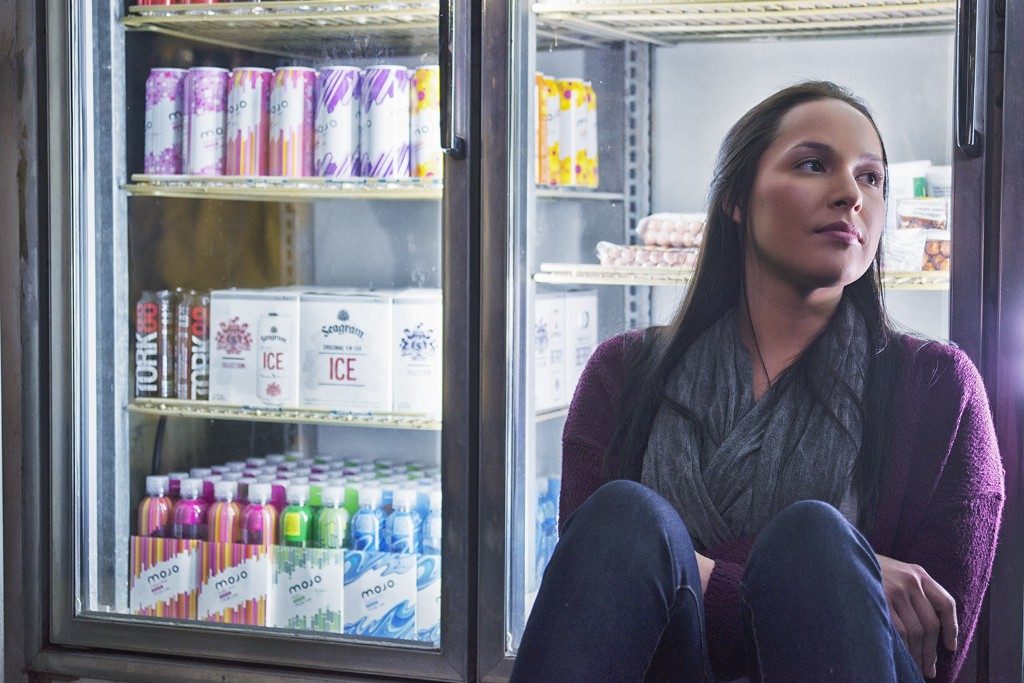Sonia
Bonspille Boileau is the first female director of
Canadian native origins (Mohawk) to have her debut feature premiere at a major
international festival. “Le Dep” premieres this Saturday, July 4, as part of the Forum of Independents competition at the Karlovy Vary
International Film Festival.
Made by an all-Native cast starring actors Eve
Ringuette and Charles Buckell-Robertson (both Innu), “Le Dep” was produced by the Native-owned Nish Media, led by producer Jason Brennan.
Canada’s First Nation tribes have been in the
spotlight recently, as government reports and media
exposure reveal the difficult conditions
under which many communities and families live.
“Le Dep” is not a political film, as the director
explains below, but its close-up and personal drama is driven by many of these
issues.
I recently had the opportunity, thanks to the aboriginal
component of Telefilm Canada’s Microbudget Program, to write and direct my
first feature film, “Le Dep.” My main
objective was to tell a drama that had both suspense and social value. And I
wanted it to be driven by a woman — an indigenous woman. That’s not an easy task when your industry is male-driven
and the society you live in (and therefore your audience) doesn’t seem to value indigenous
women.
1181. That is the number of aboriginal women who have
been murdered or gone missing in Canada over the past thirty years. Indigenous women go missing and are murdered at a much higher rate than other women in Canada. We account
for one quarter of homicides and disappearances in this country, even though we
only represent 3% of the general population.
What does this have to do with cinema? Nothing. And
everything.
I’m 35 years old. If you ask me about the indigenous
women I remember seeing on screen growing up, my answer would probably be
limited to various versions of Sexy Pocahantas and that white lady who played an
adopted Indian in “Dances with Wolves.” As
a teenager, I remember watching great documentaries about First Nation and Inuit
women. But drama? Fiction? Hollywood films? Not so much. There are great Indigenous films — don’t get me wrong — like “Smoke Signals” in the late ’90s and “Atanarjuat” in the early 2000s, just to name two. But male characters drove almost all the
good aboriginal films.
Some would argue that the talent pool is thin. I
disagree. It’s not the talent pool that’s thin, but the opportunities to
play anything other than stereotypes. Stereotypes that devalue our roles in society. Stereotypes that alter even the way we see
ourselves. If we constantly see ourselves on screen as exotic temptresses, wise but vulnerable elders or tough drunks and/or junkies,
how are we supposed to change the way society sees us? We become what we
consume. If our pop culture, art and media teach us to see aboriginal women as only
one of three things, that is what consumers are sadly going to believe.
There are many talented indigenous actresses, and several
who have had success and recognition. But in
mainstream cinema, aboriginal female roles have been limited to simplistic characterizations, one-dimensional and romanticized. They lack
context, emotional range and depth. Heck, television tries harder than film to
bring solid indigenous female characters to mainstream audiences (“North of 60,” “Blackstone,” “Mohawk Girls”).
So what does cinema have to do with missing and
murdered indigenous women? It all boils down to how women are portrayed and how
the collective we identifies with
what we see on screen. I’m not saying cinema kills aboriginal women. But it does help feed a larger social
problem, which is the relationship between Canada and First Nations women. We need to
see ourselves on screen in a powerful and resonant ways, not just in a stereotypical way.
I believe that by creating strong female roles, we’re
working towards breaking the stereotypes. We are now slowly — with films like “Rhymes for Young Ghouls,” for example — starting
to see multi-dimensional characters and powerful lead roles for female indigenous actors.
“Le Dep” is a female-driven drama. Even with a
miniscule budget and minimal input from funders, I often had to reiterate that my main
character was her and not him while I was writing and asking for feedback from different people. Even I struggled with not letting my protagonist fall into the “victim” category. Yes, in the storyline, Lydia is a “victim”
of a crime, but I wanted her to take control of it. I had to constantly reaffirm
Lydia’s role as the lead character. On set, the actors appreciated that. They
also told me that as First Nation actors, they are often limited as to what type
of roles they can play, even if they are extremely talented actors. They are
often typecast and, even worse, asked to speak with an “Indian”
accent (whatever that is!) at auditions with a slow and stoic voice. They are rarely asked
to give emotional performances.
But we are not folklore. We are talented. Trust us.
Five years ago, this film would not have been made, because five years ago, there was no such thing as an aboriginal
component to the micro-budget program at Telefilm Canada. But things move fast
when you are in an era of reconciliation. So I am hopeful. There are so many talented female actors,
but also filmmakers who put these talented women at the forefront of their
projects. Indigenous women are talented, multilayered, able, powerful. They kick
ass. Period.







